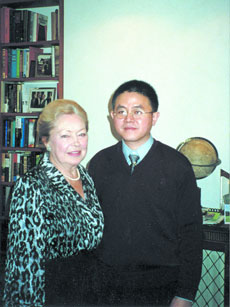Wan Yanhai, jailed last year for revealing government secrets, still speaking out
When responding to delicate questions about China’s re-sponse to AIDS, Dr. Wan Yanhai pauses for a moment, smiles, then answers.
He has to be careful.
The Chinese government tossed him in prison for a month last year after he released an official study that showed the government was aware of the spread of HIV in that country years ago.
“I think it has become more honest than before, but it is still not honest,” the 40-year-old said.
China is still lacking in transparency and public participation, he argued.
“If people can get information and network, a lot of work can get done,” Wan said. “People are not informed.”
And there is a great deal to be concerned about in China, Wan said in an interview at an October 15 benefit for the Asian and Pacific Islander Coalition on HIV and AIDS.
HIV is spreading a number of ways in China––among injecting drug users and their sex partners, between prostitutes and their customers, in China’s gay community, and through the practice of blood selling.
“There are different methods, like injecting drugs, a lot of transmission through blood transfusion and blood selling,” said Wan, who is in the U.S. on a four-month fellowship at Yale University. “In some cities where there is a gay life there is transmission.”
Estimates of the number of Chinese infected with HIV range from one million to 1.5 million. In what is widely described as a rare moment of candor, a senior Chinese official, in 2001, said the nation faced “a very serious epidemic of HIV-AIDS.”
Blood selling is the “current focus” of Wan’s Aizhixing Institute of Health Education, a private group that he launched in 1994 after working for a government agency for six years. The institute was registered last year, a sign of legitimacy in the eyes of the government.
“After my release we got officially registered,” Wan said. “Because of the detention we got a lot more support domestically and internationally. We got a lot more influence.”
Chinese who sell their blood first have some drawn which is then mixed with blood from many other people. Certain components of the blood are re-moved to be made into commercial products, then the remaining plasma is transfused back into the sellers, to reduce any side effects of having given blood. If any one seller is HIV-positive, the others in a batch could get infected. The equipment used in handling blood is often not sterilized adequately.
The practice of blood selling was most common in China in the 80s and 90s. Some blood selling ventures were private, but most were operated by the government. The government has now outlawed blood selling.
“Officially, it was ordered to stop, but there is still some underground,” Wan said.
Some of the products are sold to hemophiliacs. Another blood product is marketed as an immune system strengthener.
“Maybe you need a prescription, but I don’t think it is strictly regulated,” Wan said.
Even in some of the “most affected areas,” people are not told about the risks of blood selling and there is little HIV testing of the blood supply.
“I think the Chinese government made some effort,” he said. “It is required, but in a lot of places there is no technical capacity.”
Additionally, the government has “no positive, active investigations of blood consumers” to trace those who may have been infected and warn them and their sex partners.
“In general, there are no effective programs in China to stop AIDS,” Wan said.
Generally, the Chinese government has tried to hide the extent of its AIDS epidemic. In October of this year, a government official, who may have given Wan the official report he distributed last year, was jailed for allegedly making classified documents public.
In part because it is hiding the scope of its epidemic, China has twice been denied funds from a United Nations fund that fights AIDS, malaria, and tuberculosis, the Washington Post reported on October 8.
In his interview with Gay City News, Wan also discussed China’s queer community, which he said is still in its infancy. In 1997 the government abolished the crime of “hooliganism,” a category that traditionally was applied to homosexuality. Since then, according to Wan, the country has seen “hundreds of gay web sites in Chinese” emerge, along with roughly 20 gay and lesbian hotlines and some discussion of homosexuality in health promotion programs including one run by the government.
The size of the queer community is hard to estimate.
“It’s difficult to say because it is a really big country and most gay people are still in the closet,” Wan said. “In most major cities there are gay bars, but there is no [political] group that is openly identified in the gay community though it seems the government is becoming more tolerant.”
Wan, a bisexual who has been married since 1998, first wrote and spoke about his experiences with men in 1995.
“People were curious about my personal story,” he said. “I wrote an article about my sexual experiences. I didn’t come out as gay.”
His institute has taken up the cause of Chinese homosexuals.
“Also we expend some energy on gay and lesbian rights issues,” Wan said. “We have a lot of connections to international organizations.”



































